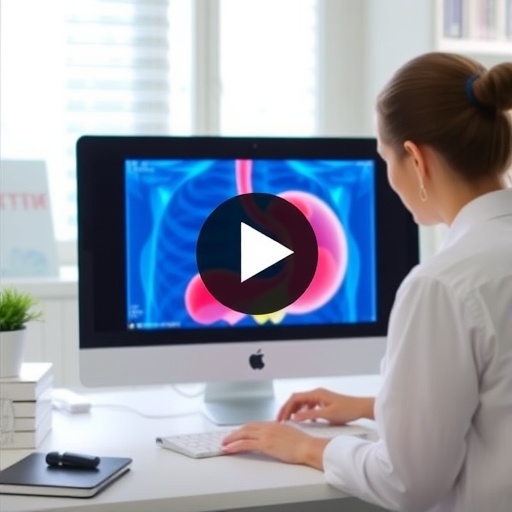In the digital age, where information flows swiftly across social media, the quality and reliability of health-related content have become pivotal. A recent comprehensive study, published in BMC Cancer, has turned the spotlight on short videos about pancreatic cancer circulating on mainstream platforms like TikTok, Bilibili, and Kwai. This research exposes the nuanced reality behind these popular digital narratives, revealing a precarious balance between medium quality content and questionable trustworthiness.
Pancreatic cancer, despite being one of the most lethal malignancies, often lacks widespread public awareness. This gap in public understanding poses a major challenge, especially when misinformation proliferates on easily accessible platforms. The study addresses this challenge head-on by evaluating short-form videos, a dominant medium for health communication today, to determine how accurately and reliably they inform viewers about this deadly disease.
To quantify the trustworthiness and quality of the pancreatic cancer-related content, the researchers employed rigorous assessment tools, including the Global Quality Scale (GQS), modified DISCERN (mDISCERN), and the Medical Quality Video Evaluation Tool (MQ-VET). These tools provided a systematic framework to dissect and rate the videos’ credibility, accuracy, and overall educational value.
The analysis encompassed 300 videos from the year 2023, sourced from platforms popular in both China and the USA. The findings revealed a median quality that was moderate in nature but hampered by low reliability scores. Specifically, the median scores were modest across the GQS, mDISCERN, and MQ-VET scales, underscoring the risk of misinformation despite the appealing format of these short videos.
One of the critical distinctions highlighted by the study was the source of the videos. Content produced by medical practitioners consistently scored higher across all metrics — with GQS scores averaging 3 in contrast to 2 for non-medical creators. This trend emphasizes the superior quality and accuracy in videos crafted by healthcare professionals, reinforcing the need for expert-driven educational materials on these platforms.
The content type also influenced reliability. Videos focusing on treatment options, prevention strategies, and detailed disease education garnered better mDISCERN scores. Conversely, videos categorized under news reports or those containing invalid information scored poorly, revealing a worrying prevalence of less trustworthy content masquerading as informative material.
Platform-specific differences emerged, revealing that TikTok videos, especially those from medical professionals, had superior mDISCERN and MQ-VET scores compared to their counterparts on Bilibili and Kwai. This suggests that platform algorithms or content moderation policies might significantly impact the quality of health information available to users.
Despite these insights, the study found only a weak correlation between video quality and their popularity or ranking. This weak correlation underscores a critical concern: high-quality and reliable videos do not necessarily reach the widest audience, while less trustworthy content can become viral, potentially spreading misinformation at a faster rate.
The study also compared the dynamics over two consecutive years, noting a decline in video quality on Chinese platforms from 2023 to 2024. GQS scores decreased significantly, highlighting a troubling trend in the reliability of pancreatic cancer-related content on these platforms.
Further comparisons between Chinese and USA platforms in 2024 revealed that both medical and non-medical practitioners’ videos from Chinese platforms demonstrated lower quality and reliability than their American counterparts. This geographical disparity points to underlying differences in content regulation, cultural attitudes to health communication, or platform policies.
These findings send a clear signal about the urgent need for enhanced curation and algorithmic oversight of health content on video-sharing platforms. Given the growing reliance on these platforms for health education, establishing robust mechanisms to elevate credible, evidence-based videos is paramount.
Moreover, the study underscores the potent role health professionals can play in leveraging these digital mediums to disseminate accurate pancreatic cancer information. Their involvement not only boosts content reliability but also potentially mitigates the spread of misinformation.
The implications extend beyond pancreatic cancer, serving as a case study for health communication strategies in the digital era. As short videos continue to gain traction for educational purposes, fostering a trustworthy digital environment remains crucial for public health.
In sum, while the accessibility and popularity of short videos offer unprecedented opportunities for health education, they also present significant risks when quality and reliability are compromised. This research pushes the conversation forward about improving digital health literacy and ensuring that critical health information, especially about deadly diseases like pancreatic cancer, reaches and educates the public effectively.
The study is a call to action for digital platform stakeholders, healthcare professionals, and policymakers alike to collaborate in refining the quality filters and educational content algorithms. Only then can these platforms fulfill their promise as valuable tools for public health promotion.
As online video content continuously evolves, ongoing monitoring and research into content quality remain essential. The fight against cancer misinformation is a vital front in the broader campaign to improve global health outcomes through accurate, trustworthy information dissemination.
Subject of Research: Assessment of the reliability and quality of pancreatic cancer-related short videos on mainstream social media platforms.
Article Title: Assessment of the reliability and quality of pancreatic cancer related short videos on mainstream platforms: cross-sectional study.
Article References:
Peng, J., Tu, M., Li, S. et al. Assessment of the reliability and quality of pancreatic cancer related short videos on mainstream platforms: cross-sectional study. BMC Cancer 25, 1428 (2025). https://doi.org/10.1186/s12885-025-14825-2
Image Credits: Scienmag.com
DOI: https://doi.org/10.1186/s12885-025-14825-2
Tags: Bilibili pancreatic cancer videosdigital narratives in cancer educationGlobal Quality Scale for health videoshealth misinformation on social mediaKwai video reliability assessmentMedical Quality Video Evaluation Toolmodified DISCERN tool for video evaluationpancreatic cancer awarenessshort-form video impact on public healthTikTok health content analysistrustworthiness of online health informationvideo quality evaluation in health communication





